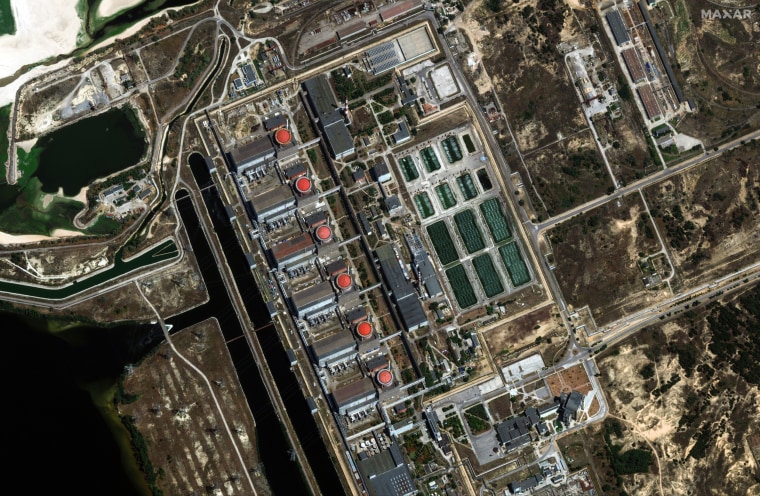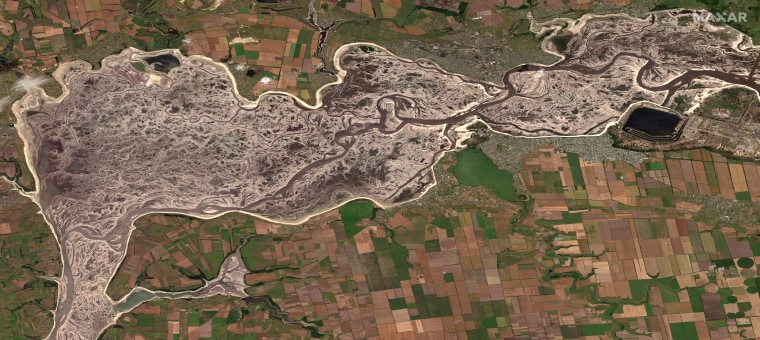Europe’s largest nuclear plant is ‘extremely volatile,’ watchdog warns
KYIV — Sitting on the front line of the war between Russia and Ukraine, Europe’s largest nuclear power plant is near the brink of a disaster that could imperil the Continent, according to international monitors and Ukrainian officials.
The situation is “extremely volatile,” said Rafael Grossi, the director general of the International Atomic Energy Agency (IAEA), which closely monitors the Zaporizhzhia facility in the southeast Ukrainian town of Enerhodar. Ukraine’s national energy company and former employees at the plant are also sounding the alarm.
“It is the most dangerous situation that we have,” Grossi told NBC News in an interview last week. “It’s my job not to sow panic, but at the same time I have to tell the truth about what is happening.”
There was growing international alarm when the site was shelled in the months after Russian President Vladimir Putin launched his invasion of Ukraine two years ago this Saturday, Feb. 24. And Ukrainian officials have also warned about staffing levels and general maintenance of the plant, which became operational in 1984.
Both sides have since blamed the other for attacks in the vicinity of the complex, which Russian forces seized shortly after the start of the war and is almost twice the size of Ukraine’s Chernobyl plant, the site of the deadly 1986 disaster widely considered the worst nuclear accident on record.

The atomic energy agency has repeatedly warned about the dangers of a direct attack on the site, although it has noted there has been no shelling of the facility since May.
However, Russian forces remain in control of the plant, which is right on the eastern bank of the Dnieper River, and all the territory around it, including the company town of Enerhodar. Ukrainian forces have maintained control of the river’s other bank.
As the focus of the fighting has shifted farther north, another concern is the frequent power outages at the plant, where eight blackouts have been reported since the start of the war, the most recent in December, according to both the IAEA and Energoatom, Ukraine’s national energy company.
“When you have a blackout, lack of external power supply at a nuclear power plant, the cooling function of the reactors is lost, and you could have a meltdown,” Grossi said.
He added that the situation could be compared to 2011’s disaster at the Fukushima Daiichi Nuclear Power Plant in Japan, when three reactors melted down in an accident caused by a huge tsunami that battered the country’s eastern coast.
Zaporizhzhia is different because the plant’s six Soviet-era reactors were put into semi-shutdown to stop the nuclear fission reaction and generation of heat and pressure shortly after the start of the war. As a result, they are in a colder state than those in Fukushima and therefore less volatile.
Powering the plant has nonetheless become increasingly difficult because three of the four lines supplying the complex have been destroyed and the fourth is faulty, according to Petro Kotin, the CEO of Energoatom, which ran the facility before it was taken by Russian forces.
For now, the plant is relying on 20 backup diesel generators to keep the reactors operating safely, said Kotin, who is still in contact with a number of Ukrainian workers at the plant.
The destruction of the Kakhovka dam farther up the Dnieper River has also proved problematic for operators at the plant. Water from the dam’s reservoir had been used to cool the reactors, which now could overheat and melt down if turned on.

New wells are being drilled at the plant to make up for the supply of cooling water lost by the dam’s collapse, according to the IAEA.
Another serious point of concern is the lack of qualified staff to oversee safety under the plant’s current operators, a subsidiary of the Russian state nuclear company, Rosatom.
Before the war, about 11,000 employees worked at the plant, many of whom fled as Russian forces advanced. Now there is just a skeleton crew of about 4,000, according to Energoatom, which like Kotin still receives information from both current and former staff members.
Kotin said the Ukrainian staff who stayed behind were forced “under pressure and even under torture” to sign contracts with Rosatom.
NBC News has asked Rosatom for comment on power supply and the staffing issues at the plant.
After the plant fell into Russian hands, Serhii Romanyuk said he reluctantly…
Read More: Europe’s largest nuclear plant is ‘extremely volatile,’ watchdog warns

